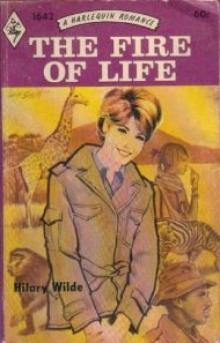- Home
- Hilary Wilde
The Impossible Dream Page 2
The Impossible Dream Read online
Page 2
She wondered what he meant. Was the destruction of poor Patrick part of Craig Lambert’s plans?
A huge white Rolls was waiting for them. The chauffeur, dark-skinned, wearing a smart green uniform, opened the car doors. This had never been part of the dream, she thought, a Rolls-Royce! White, too!
The chauffeur drove slowly. He had little choice, for the narrow main street was crowded with cars, cyclists, and a kind of chair on wheels, drawn by a Creole running in the shafts and which carried two people. Everywhere there was colour. The shop windows sparkled with scintillating swinging toys or the bright green or purple materials, draped round dummies. The pavements were crowded, too, and no one seemed to be in a hurry. Nor did any of them look alike, for she saw Chinese faces, Indian, Creole as well as white skins.
It was as if Craig Lambert read her mind. ‘We have a real international mixture here. These islands were invaded so often in the past, leaving behind these souvenirs.’ He gave a strange smile that seemed to relax his stern face.
They drove past the White Cross where wreaths of flowers were leaning against it, and then, as they left the town behind, the road became emptier and their passage faster. It was fascinating, Megan thought, as she looked eagerly on every side. All these colours ; all the trees and bushes seemed ablaze with brightly coloured blossoms. As the road twisted and turned to take the steep mountain gradually, she looked at the funny little houses and the small children waving and she waved back; sometimes there were groups of women, their skirts tucked round their waists as they walked into the narrow streams to wash their clothes.
As the car took a slow turn on a miniature plateau, Megan caught her breath. She could now see the other side of the town and stretching up in the middle of this small group of buildings was what looked like a thick finger reaching up towards the sky. It was so hideous, so out of keeping with the quiet beauty of the island that it shocked her.
‘What’s that?’ she asked impulsively.
‘Hotel Anglais. Run by Gaston Duval,’ Craig Lambert said sharply. ‘You’ve heard of him?’
She hesitated for a moment, but there was no point in lying.
‘Yes, I . . .’
‘Met him?’ Craig Lambert snapped.
‘Of course not.’ She was annoyed by his way of throwing questions sharply at her. ‘How could I? I’ve never been here before.’
‘That’s as may be, but Gaston Duval gets round the world quite a bit. Your brother’s dancing school, by the way, is quite near the hotel.’
‘Is it?’ She wondered what was best to say and decided to say as little as possible.
‘Your brother and you are not good friends?’ Craig Lambert asked abruptly.
Megan felt the surge of loyalty rising inside her.
‘I didn’t say that. I said . . . well, we are friends, but that’s all.’
‘Why don’t you get on better?’ Perhaps he saw the look on Megan’s face, for he lifted a phone from his side of the car and gave instructions in the strange French he had used on the jetty. The chauffeur, sitting very upright as he drove, nodded and at the next plateau, always placed where a severely sharp turn came, drove off into a narrow side road which the trees lined, their leaves meeting overhead so that it was like a cathedral, and there was a green light as the sun was shut out. Then, as they turned a corner, Megan saw the most beautiful view. The trees had gone, save for a few palm trees on a lawn, underneath which were some tables. The small square house was half hidden by purple flowers.
‘I’m having coffee, or would you prefer a cold drink?’ he asked curtly as he led the way to one of the tables, settling Megan in a chair. ‘My favourite view.’
‘It’s beautiful. Coffee, please.’
‘Black or white?’ he asked.
‘White, please.’ Megan, leaning on the table, rested her face on her hands, as she stared at the view before her. The blue ocean spreading away. There were no quiet coves below here, just the ocean speeding in, rushing madly towards the rocks, tossing as if furious with the world. It was so . . . so . . .
‘Why don’t you like your brother?’ Craig Lambell’s curt voice jerked her back to the present.
‘I didn’t say I didn’t like him,’ Megan said, giving him a quick glance, for she wondered why he had suggested stopping here. Surely they could have had coffee at the school?
‘No, but you implied it. Look, there are some questions I want to ask you. It’s simpler here than at the school, because I’m always busy there.’
Megan looked away quickly. What sort of questions, she wondered. She must be careful what she said—in case it affected Patrick.
‘Excuse me a moment,’ she said. ‘I just want to look at this lovely view.’
She walked across the lawn to where a wall had been built of rocks. Leaning against it, she found she could look down on the small town they had recently left. How tiny it looked, she thought. Why, the houses were more like a group of children’s dolls’ houses and the yachts so still in the smooth lagoon looked like little paper toys.
‘Are you jealous of your brother?’ The words, close to her ears, made her jump. She turned quickly and found Craig Lambert by her side, leaning on the wall.
‘Jealous?’ She was really startled. Never had she thought of herself as being jealous, but . . .
She looked up and found Craig Lambert’s eyes were narrowed thoughtfully. He was not smiling, so it was not a joke.
‘I . . . well . . .’ she began, then nodded. ‘I suppose I am,’ she said. ‘My mother died when I was born and my father never forgave me. He adored Patrick. He’d do anything . . .’ She stopped abruptly. Perhaps it would be unwise to let Craig Lambert know about Patrick’s recent desperate cry for financial help?
‘That’s unusual. Usually the father adores his daughters, and it’s the son who gets neglected.’ He paused and again, suddenly, his question seemed to jump at her: ‘Why did you want a new job so badly?’
‘Be . . . because . . .’ Megan began, then paused. Had she to answer these questions? she asked herself. Had he the right to expect her to do so? Had he the right, even, to ask them? Maybe he had, though, for—as Miss Wilmot had said—his responsibilities at the school were terrific and that was why he was more interested in his employees’ characters than their abilities.
‘Why?’ she repeated slowly. ‘Well, it all came as rather a shock to me. My father wanted to go and live with my aunt in Dorset . . . She lives in a lonely part and said she needed a man about the house. She’s very deaf and nervous and I suppose she thought a man would keep vandals away. Not that I can see poor Dad doing much,’ Megan went on, her voice wistful. ‘He has this wretched arthritis and is always losing balance. He’s so afraid of falling that he hardly dares to walk anywhere.‘
‘So you had to find a job? You like your aunt?’
Again Megan hesitated. ‘Yes and no. She’s deaf and rather difficult. She looked after us for all my life and nothing anyone did was ever right. Then when . . .when . . .’
‘You were sixteen when she left you,’ Craig Lambert finished for her. ‘I understand you had to leave school, though you had a promising future, and also had to give up dancing. You like dancing?’
A little puzzled, wondering how he could know so much, Megan nodded. ‘We were all dancers, you see. Mother and Dad danced a lot, and often won international competitions. They were really good. Then she died and he began to get this wretched arthritis. So did . . .’ Megan paused, not sure if it was wise or not to mention her brother. Yet Patrick’s name could not be left out without it seeming strange. ‘Patrick and Georgina danced a lot and won prizes. I also had a partner.’
‘What was his name?’
The question startled her, because she hadn’t thought of her one-time partner for ages. ‘Reggie . . . Reggie Blake.’
‘You still meet him?’
‘No.’ She was even more puzzled, since she couldn’t see what connection it had with her job. ‘He was furious when I said I coul
dn’t go on dancing. You see, you have to practise all the time and be free to travel about, and I just couldn’t leave Dad alone. He had this dreadful fear of falling down and breaking a hip.’
‘So you gave up dancing, too,’ Craig Lambert said thoughtfully, then turned to look at her. ‘Willingly?’ he asked.
‘Willingly?’ Puzzled, Megan had repeated the word.
‘Yes. I mean was it your idea or did your father have to ask you to give up dancing?’
‘He didn’t know why I stopped. Of course I didn’t tell him. He wouldn’t have liked it at all. He’s very independent in many ways. I had no choice as far as I could see it. Dad needed me—and that was all.’
‘I see. Oh, the coffee’s come. We’d better go and drink it,’ Craig Lambert said, leading the way back to the table. ‘I can’t help wondering what made your father suddenly decide to live with your aunt. Did they get on well together? Would she be a good nurse?’
Megan hesitated again. Whatever happened, she wasn’t going to tell Mr Lambert that the house had been sold in order to help Patrick—and that was why she had been practically thrown out of the house that had been her home all her life.
‘She’s not very patient, she thinks he’s seeking attention and has no sympathy. I can’t see how they . . .’
‘Maybe he felt you were leading too narrow a life and that it would do you good to go out into the world.’
‘I doubt if he ever thought about me,’ Megan said bitterly, then wished she hadn’t been so honest as she saw Mr Lambert open his eyes wider as he stared at her.
‘You could be wrong, of course,’ Craig Lambert said slowly. ‘Well, you had to find a job. I take it you told Mrs Arbuthnot and she told you I had already been there, asking if she could recommend someone. I know it seems strange, with a school like ours having to look for a dancing mistress, but I’ve set a very high standard for the staff and I wouldn’t take just anyone. Often the girls have what used to be called “crushes” on the staff and I want to be certain that the staff concerned will be a good influence on them. What I can’t understand is why Mrs Arbuthnot, who obviously valued you highly and had no desire to lose you—why did she tell me about you? You’ve known her for some time?’
‘All my life. She taught me all I know about dancing. She was a great dancer once, but broke her hip and it never got properly healed. I think she wanted me to get a job far away because she was afraid Aunt Lily would rope me in to look after them both . . .’
‘And of course you’d have gone.’
Megan looked at him. ‘I’d have had no choice, would I?’ She laughed. ‘Mrs Arbuthnot is a darling. She said that would be the end for me and my whole life would be ruined.’
‘And you’d have had no chance to find a nice husband,’ he said.
‘I . . .’ Megan looked at him again. ‘I never thought of marriage. You see, I couldn’t . . . well, I just couldn’t leave Dad. He isn’t so old, though his arthritis made him retire much earlier than he should have done and he could live for another thirty or forty years. The doctor says he’s in fine health—’
‘Apart from his arthritis.’ There was a slightly sarcastic note in Craig Lambert’s voice that annoyed Megan at once.
‘It can be terribly painful,’ she said quickly.
‘I’m aware of that, Miss Crane,’ he said. ‘You seem to lay great stress on doing your duty. Unusual in this day and age. Do you feel the same sense of duty as regards your brother?’
There was a long pause as she stared at him. What did he mean? What was he trying to trick her into saying?
‘In a . . . in a way I suppose so, but I can’t imagine Patrick ever needing me.’
Craig Lambert stood up. ‘That’s what you think,’ he said. ‘We’d better get going. I’ll tell you more about the school on our way.’
Back in the spacious, luxurious car, Megan found it hard to concentrate on what Craig Lambert was saying, for she couldn’t forget the way he had said: That’s what you think. What had he meant? Was he planning to do some mean trick on Patrick and include her in it?
The car crawled along the winding narrow roads that wound up and down the mountains, into the deep valleys, then up far above it again. Megan sat meekly, trying to listen to what Craig Lambert was saying. She had her hands folded, but she had to dig her nails into the palms as she tried to force herself to concentrate.
‘My grandfather had one son and three daughters. It was the girls he adored; he had no time for his son. Perhaps that was why my father . . .’ Craig Lambert paused and then went on: ‘My grandfather searched the world for a school good enough for the girls. He couldn’t find one, so he built this one. Soon it became famous, selective, and it had a long waiting list. When he died, my father took over.’ His voice changed. ‘Unfortunately he hadn’t been properly trained to handle the responsibility of the job and soon it began to deteriorate and lose prestige. When he died, I came back from South America and had to repair the damage caused to the school and its name. I succeeded until a new problem arose. This island was far from the madding crowd, but suddenly it became a holiday centre. A number of people have come to live here whom we consider completely undesirable.’ He looked at the girl sitting silently by his side and paused, as if giving her a chance to speak.
Megan said nothing. She felt it was wiser to hold her tongue, for she could feel the anger again. Why did he so condemn poor Patrick? All Patrick was doing was to earn a living, a living that wasn’t made any easier by the extravagant girl he had married.
‘Gradually, however,’ Craig Lambert went on slowly, ‘we’re gradually erasing them.’
Megan had to cling her fingers together as anger swept through her. Erase? Could there be a more callous expression? In other words, wipe them out, force them to become bankrupt and lose everything just so that he could get rid of those he disliked?
‘We have to have strict rules at the school,’ Craig Lambert continued. ‘There’s always the danger of kidnapping to be faced, of course, also of the wrong type of friends being made. These are not children we have at the school. Many of them are old enough to have been married several years, but their parents refuse to let them leave school because they feel they’re safer here until a suitable husband can be found. This, as you can imagine, can cause some friction. No girl is allowed to move about the island alone. This is plainly understood.’
Poor things, Megan thought quickly. ‘And the staff?’ she asked, unable to resist saying it.
He showed no surprise or annoyance. ‘That’s quite different, of course. We only employ those we can trust, but we do ask them to always leave notice of where they go. This is to ensure that we can contact them immediately if they’re needed.’
‘What about transport?’ Megan asked. ‘The school seems an awful long way from the town.’
‘Actually it isn’t far. Perhaps I should say unfortunately, because I’d prefer us to be further away. However, we came this long way so that you could see something of the island and its beauty. Most of the staff have cars of their own. There are also buses on Wednesday and Sunday, going both ways. Naturally, when you want to visit your brother, we can arrange a lift.’
‘Thank you . . .’ Megan began, not sure if she liked the sound of that. Was Mr Lambert planning to keep her under observation when she visited Patrick? she wondered. ‘Oh, look, isn’t it gorgeous!’ she cried impulsively, leaning forward as they passed a huge, aged tree whose trunk and branches were twined with the long clinging tendrils of a purple-flowered bougainvillea. ‘What a marvellous colour!’
‘What? Oh, yes, the bougainvillea. You know the name of the island we prefer? It has many names—ours is the Isle of Purple Flowers. Quite suitable.’
‘It’s all so beautiful.’ Megan’s voice was awed. Now they had left the mountains and were driving through what seemed like the avenues of trees they had passed earlier, then coming into the sunshine, passing by waterfalls that had looked like a silver line from the schooner but now we
re amazingly wide as the water frantically pushed its way through the rocks.
‘We’ll be there soon. Just round that cluster of trees. I hope you will find Miss Tucker congenial—our headmistress, a fine woman, but rather out of date in her view. Comes of a military family, hence very keen on discipline. As you can imagine, very few today can accept that, but here they must.’
Megan shivered. There had been something ominous in the way he had said they must. She could almost imagine him with a horsewhip in one hand . . . then she had to laugh. What an imagination she had! He couldn’t be such a monster or he wouldn’t have been so friendly that day, going to the trouble of meeting her and bringing her this long way round . . .
She caught her breath. Or was it because he had wanted to question her? Had she unwittingly said something that could hurt Patrick? she wondered.
What would life at the school be like? she asked herself. It was beginning to sound like a prison. What he was implying was that you had to conform or get out! No wonder the salary was so generously high, and that once a year, return fares were paid to the staff so that they could go home for the long holiday. In addition Miss Wilmot had told her there was a flatlet for each member of the staff, who could cook for herself or go to the communal dining room as she preferred. Megan wondered which she would do. It rather depended on the other staff, she thought.
‘Here we are,’ Craig Lambert said, his voice proud, as the car left the trees and slowed up along the road leading up to Lambert School.
Megan gasped. She didn’t know what she had expected to see, but it was certainly not this massive mansion built in the shape of an L, with courtyards, and two sides facing the sea. The chimneys were Elizabethan, long and decorated, the windows on the ground floor were large picture ones, but on the two floors above, the windows were smaller, but each room had a balcony. The garden in front was gay with flowers, everything symmetrically arranged so that nothing was out of place. On either side of the doorway stood a huge white-blossomed gardenia. On the other side of the building stretched tennis courts, hockey fields—she could even make out a distant golf course.

 Uncertain Joy
Uncertain Joy The Blue Mountains of Kabuta
The Blue Mountains of Kabuta The Isle of Song
The Isle of Song Red as a Rose
Red as a Rose The Master of Barracuda Isle
The Master of Barracuda Isle A handful of dreams
A handful of dreams The Turquoise Sea
The Turquoise Sea The Fire of Life
The Fire of Life The golden valley
The golden valley The Impossible Dream
The Impossible Dream Paradise Island
Paradise Island